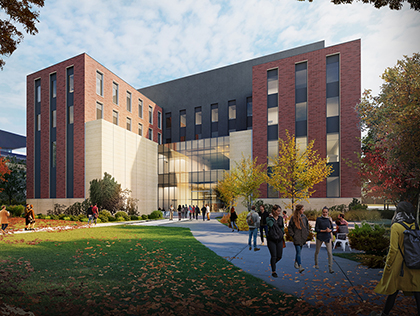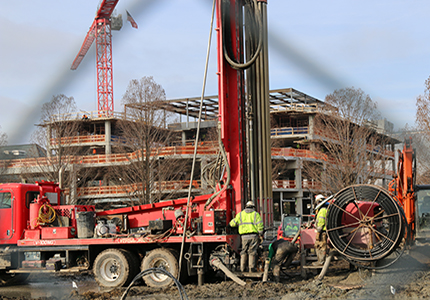Jan 3, 2024
Wymer Hall going geothermal to enhance sustainability
When completed, Steven S. Wymer Hall will be a signature facility that showcases both Gies Business’ educational excellence and commitment to sustainability. A key part of the sustainability effort is the use of geothermal technologies to help provide heating and cooling to the building and optimize the temperature as the building’s occupants engage in instructional and research activities.
The geothermal energy discipline encompasses a broad spectrum of technologies that tap into the Earth’s ambient thermal energy. In some applications it can be used to generate electricity. In others, this inexhaustible energy resource can be a reliable, flexible source for heating and cooling in residential, commercial, agricultural, and industrial structures.

Steven S. Wymer Hall is a partnership between Gies Business and the University of Illinois Urbana-Champaign to provide an advanced, high-tech facility serving both on-campus and online learners. The nearly 100,000-square-foot building, which will stand on Gregory Drive between the Business Instructional Facility and Huff Hall, will support Gies’ foundational commitments to access, innovation, excellence, inclusion, and engagement. Additional studio space and recording capabilities will serve the College and University’s rapidly growing online programs, enabling Gies and other units on campus to expand access and create a highly engaging learning environment. Expanded collaborative space for experiential learning and group work will foster a culture of inclusion and innovation. New, larger classrooms – which will also be shared with other units on campus – will support projected enrollment growth, ensuring Gies can expand life-changing access to education. And additional office space for Gies faculty and support staff will ensure a collaborative environment where colleagues can continue their tradition of excellence.
Crews broke ground on the building in April 2023, and construction is expected to be completed by January 2025.
Andrew Stumpf, a principal research scientist and geologist with the Prairie Research Institute and an expert in geothermal energy, explained how the system at Wymer Hall will work. “Exchanging or transferring thermal energy with the ground, known as the process of geoexchange, will be done by circulating water through a loop of pipe made of high-density polyethylene (HDPE) that runs from the building out-and-back to the geothermal borefield. In the building, the water runs through geothermal heat pumps (which operate like a refrigerator) where heat from ground is brought into the building, or excess heat in the building is transferred to the ground.”
Reducing the use of fossil fuels
The geology of Illinois is well suited for running geoexchange systems because of the relatively soft underground formations that don’t impede drilling and a high groundwater table. Thermal energy is exchanged much easier through water in the pore space than air. Also, the geoexchange boreholes are constructed at depths where the ground temperature remains constant throughout the year that allows the heat pumps run more efficiently.

“Because geothermal heat pumps require a small amount of electricity, the overall energy demand is greatly reduced – minimizing our dependence on fossil fuels,” Stumpf explained. “The opportunity to reduce overall building energy usage – termed ‘energy avoidance’ by facility managers – and practice energy conservation is an important aspect of the University of Illinois’ Climate Action Plan (iCAP).” As an example, he said that the Campus Instructional Facility (CIF), which also utilizes a geoexchange system, was using about 58% less energy than comparable buildings on campus running on fossil fuels.
The use of geothermal heat pumps for heating and cooling is not a new technology. The first geoexchange system in the Midwest US was developed in the 1940s, which became more widespread for heating and cooling buildings since the 1970s. For Wymer Hall, 70 boreholes will be drilled in the field behind Wymer Hall (the Military Axis). The HDPE piping will be placed into the boreholes and run in trenches near the surface into the building. Typically, two wells are drilled per day that reach a depth of 450 feet.
A fit within Gies Business’ history of sustainability
The Illinois Geothermal Coalition at the University of Illinois Urbana-Champaign developed a white a paper on Geothermal in the Midwest to help educate stakeholders and the public about the potential this renewable energy resource offers. It reports that colleges and universities across the country are turning to geothermal systems as part of their strategies to meet sustainability goals to significantly reduce their carbon footprints. The use of geothermal energy also provides new educational opportunities, supports energy security by enhancing operational resiliency, and creates jobs in the “green” renewable energy industry.
Wymer Hall’s geothermal system is a new approach for Gies Business facilities, but the College has long had a commitment to sustainability. When the Business Instructional Facility (BIF) was built, it was the first facility at the University of Illinois Urbana-Champaign to begin the certification process for a LEED (Leadership in Energy and Environmental Design) designation. BIF earned LEED platinum (the highest possible rating) in December 2009. The work on Steven S. Wymer Hall continues this commitment to using the latest technological innovations to promote sustainability and apply responsible design standards.
Arlene Vespa, the capital construction and building project manager at Gies who is overseeing the building project, said, “When you have the vision and commitment of university leadership as demonstrated in the iCAP, big strides are possible. The entire project team (Gies, campus Facility and Services, Real Estate Services, and the developer) has formed a partnership dedicated to pushing campus to the next level in environmental stewardship. Wymer Hall is proving to be pivotal to the next big aspirational goal at Gies college: Gies net zero. Stay tuned.”
Supported by University of Illinois students
The geothermal system at Wymer Hall received funding support from the Student Sustainability Committee (SSC) through the Sustainable Campus Environment Fee & Cleaner Energy Technologies Fee. These student fees support projects at the University of Illinois Urbana-Champaign that increase environmental stewardship and inspires change to make a more sustainable campus.
SSC was excited to help support this project. “The feedback we are getting from students is that they are excited about geothermal. They’d love to see more and more of that on campus,” said Tori Lawlor, a communications and agriculture and consumer economics major and the vice chair of communications for SSC. “It’s important to us to represent what students want to see in terms of sustainability on campus.”
The SSC was particularly excited to support the project because of the impact it will have on students, whose fees provide the funds that SSC gives out. “You can look at how many students are likely to go into Wymer Hall to study or take a class,” said Claire Keating, chair of SSC and a natural resources and environmental science major and business minor. “Seeing the amount of students that are going to be in this new facility, that gives us the assurance we like to see for students getting a return on their investment – high numbers of students that will use this project.”
